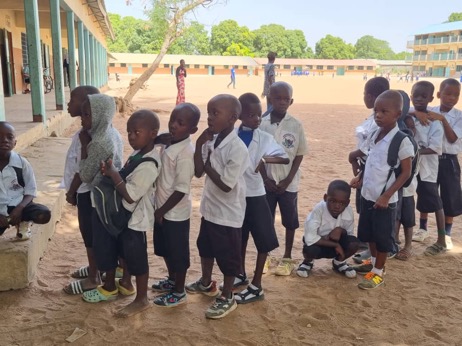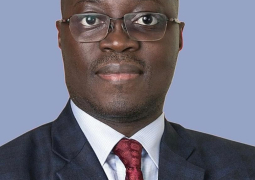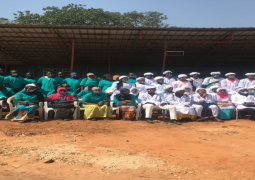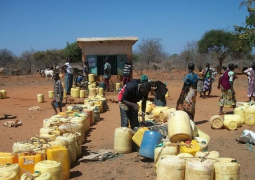
The campaign spearheaded by the Ministry of Health in collaboration with the World Health Organisation (WHO) intends to eliminate the scourge of Schistosomiasis, thereby preventing communities from this parasitic disease, which still remains one of the Neglected Tropical Diseases.
Overall, the campaign, targets half a million individuals in the 27 most-endemic districts of the country. The campaign is focusing mainly pre-school children (2 – 4 years and 11 months); school-aged children 5-14 years) and At-risk adults.
Despite it being a neglected disease, Schisto as widely referred to, remains one of the health burdens many developing countries are grappling with.
Most of the communities visited by the media saw mass turn out by students and even some adults.
Sare Sarjo village, Kiang, Lower River Region
One of the communities in Kiang is Sare Sarjo and Sheikh Tijan Cham, a public health officer at Kwinella Health Centre, expressed delight with the response from the community.
He spoke highly of the mass turnout and the level of cooperation among the locals and thanked the visiting communities for the trust and confidence reposed in the visiting health teams.
“We first sensitise these villages before going there and this has helped us greatly. All the villages we visited so far, people came out in their numbers to take the drugs to prevent themselves from the Schisto.”
Ousman M Camara, Principal public Health Officer in the Region, underscored the importance of the campaign.
“Schisto has been with us in the environment for a very long time and most of the time when children bath in these contaminated water bodies, they at risk.”
He expressed delight with the feedback he is getting from the teams on the ground, saying the level of response from students and even communities is great.
He spoke of the good interaction they had with the Regional Education Officials, which he said, has helped them mobilise more students to partake in the campaign.
“However, some of the few challenges we have was the low sensitisation prior to the campaign. We should have series of sensitisation. Nonetheless, we were able to overcome those challenges because we make sure in any community we go, our teams first tried to inform them about the disease prior to our coming. And that actually help us.”
This, he said, has affected them as most of the school authorities need prior notification before the arrival of the teams, but with the good working relations with the Regional Education Directorate in the Region, they were able to address those challenges.
Central River Region
One of the communities visited in this region was Daru Lower Basic School. Here pupils were seen in their numbers lining up to take the drugs.
One Dawda Jallow, a beneficiary, underscored the importance of the campaign.
He commended the people for their turn out and called on others, who have not to come forth, volunteer to take the drugs and prevent themselves from this parasitic disease.
Lamin Sawo, Regional Principal Public Health Officer, Regional Health Directorate, Central River Region, acknowledged that Schisto is endemic in CRR and that after the 2015 mapping, they realised that the region has a prevalence rate of 14%.
“The Epidemiology and Disease Control Unit under the Neglected Tropical Disease Control and the Ministry felt it necessary to conduct this MDA campaign. We did one campaign in 2021 around November and December and after that we have seen a decline in the number of cases we see at our health facilities by reviewing the records.”
After a close consultation with the programme, they realise the need to conduct another campaign to stem the tide of Schisto in the region.
He thus expressed delight with the level of response of the public, saying all the teams are registering breakthroughs at their respective districts.
“It is a house-to-house campaign and we also use the ‘bantaba’ approach to encourage more people to participate. We are targeting 213,000 people but we have high priority group as well as low priority group. The high priority group is about 40,000 and the medium priority group is about 21,000.”
Drug hesitancy and misconception surrounding western drugs, sometimes tend to discourage some people. Sawo, however, indicated that the drugs being administered in this campaign are safe and effective.
“Any medicine you see there are side effect. But let’s weigh the two and one would realise that the benefits far-outweighed the side effects.”
He made refence to Niani and Lower Fulladou Districts, where the disease is most prevalent according to the reports from the teams on the ground, saying ‘if this campaign’ can be a success, would be a health deal in eradicating Schisto in the area.”
He called on all to volunteer and participate in the exercise, as the drug is safe and effective as in line with World Health Organisation guidelines.
In Upper River Region
During a visit to Dingiri Basic Cycle in Upper River Region, pupils were seen lining up ready to take the drugs, thanks to the aggressive community mobilisation in the area.
For Ebrima Nyimanta, a focal person for the Expanded Programme Immunization (EPI) in the region, who doubles as Regional Operational Officer, revealed that anyone who is familiar with the geographical location of URR, would come to a conclusion is that the region is an endemic area when it comes to Schisto.
The campaign, he added, is very important especially for URR, as the public health teams will administer these drugs that will protect the population from this parasitic disease.
“In URR, all the seven districts are targeted for this campaign; targeting a total of population of 258,924 individuals.”
The side effect associated with the drugs, he added, is hindering the progress, but called on all to volunteer as the drugs are tested to be safe and effective in protecting people from the parasitic disease.
He said people always have different misconception when it comes to western medicine, but assured all that the benefits of taking the drugs far outweighs the disadvantages.
Read Other Articles In National News

New EBID chairman pledges commitment to regional growth, integration
Apr 16, 2025, 11:27 AM
Coronavirus: AGA Global supports Gambians with rice, sanitary materials
Apr 8, 2020, 3:47 PM



